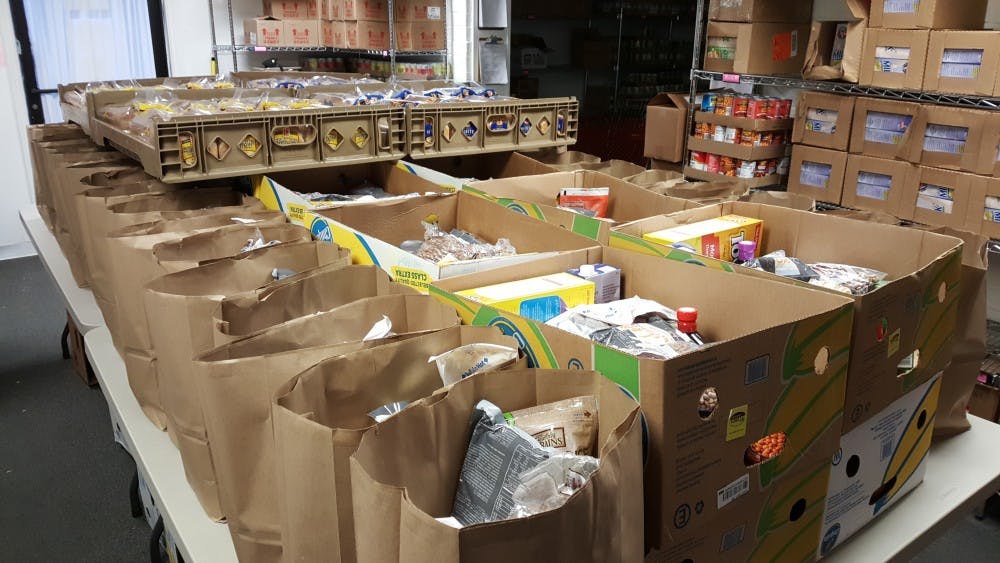Athens faces a difficult problem, one that many students may not notice while enjoying the dining hall buffet line.
That problem is hunger, and it is an issue that many families and individuals in the Athens area may encounter on a regular basis. Luckily for them, they have the support of local food pantries.
Around the Athens area, there are a plethora of food pantries and emergency dining options. Two recognizable options are the Athens County Food Pantry, 528 Richland Ave., and the Athens County Catholic Community Food Pantry, located at Christ the King University Parish, 75 Stewart St.
The Athens County Food Pantry served 5,165 households in 2016 alone, and the Athens Catholic Community served more than 1,300 households this past year.
Both of those organizations have very similar origins tied to church affiliation, with the Athens County Food Pantry being created by a board of Christian representatives in 1980. The county pantry is now run by a combined board of church representatives and at-large representatives. The Athens Catholic Community Food Pantry is overseen by the local Catholic parishes of St. Paul Catholic Church, Christ the King and Sacred Heart Catholic Church in Pomeroy.
For both organizations, the majority of the food is purchased from the Southeast Ohio Foodbank with monetary donations. The Southeast Ohio Foodbank is affiliated with Feeding America, which sources food from various sources and sells it at a reduced rate to participating food pantries in bulk.
In addition to that supplied by the food bank, the remaining food is donated directly from Athens residents or purchased from local businesses. If an individual, business or organization wishes to donate to a food pantry, it is recommended that they donate nonperishable goods, such as canned or dried items. Long-lasting produce, like potatoes or apples, is also recommended. Donating items that spoil easily like fresh protein or leaf vegetables can be done, but it is necessary to contact the pantry first, as special considerations must be taken into account for the storage and distribution of those items.
Nancy Bain, the food coordinator for Athens Catholic Community Food Pantry, said the pantry tries to buy the most economical food options.
“We usually try to buy locally. We have great big bags of kale, green peppers, apples and potatoes that come from the (Athens) Farmers Market,” she said. “Sometimes, hunters will bring in fresh venison, which people generally like.”
Problems can sometimes arise with the quality of donations. Canned goods are a particular problem because sometimes people donate “clean-out-the-pantry” items, Athens County Food Pantry food co-chair Mike Harrington said, meaning old canned food that has been sitting in a cupboard for a long time. However, if a canned food is past its sell-by date, people shouldn’t just throw it out.
“With canned items, (the) best-by date is a measure of food quality in terms of taste, not food safety,” Harrington said. “Canned items can be good for sometimes four years after the best-by date, but by then, they usually taste bad. If it is a little bit past the best-by date, we will still take it. This does not extend to things like baby formulas, which have a solid expiration date.”
The majority of food from the Athens County Community Food Pantry is distributed through the local Job and Family Services center. In order to receive food, one has to register and provide ID, as well as some basic income information. Individuals may only acquire food from the pantry once every 30 days, which can be a struggle for some.
“It is important to know that there are more than only one option for food assistance out there,” Harrington said. “The United Appeal is a good place to start. On their website they contain a list of food agencies.”
Although it is always important to donate, it is important to note that the holiday season isn’t the only time to do it.
“This is the time of year that people think of the food pantry and hunger, but after it, people tend to drop off,” Athens County Food Pantry board member Karin Bright said. “Summer is an especially important time to donate because kids will not receive school lunches.”






